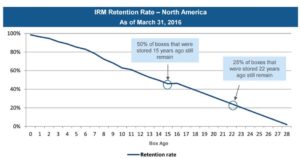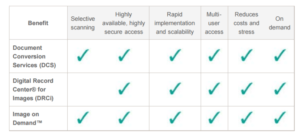Iron Mountain looks for new ways to “Shred it”

How Iron Mountain is navigating a world that is shifting away from paper
Overview of Iron Mountain
Iron Mountain (“IRM”) provides physical document storage, information management, and document shredding services. With an estimated ~60 market share, Iron Mountain is the clear leader in the ~$7bn global document management industry[1]. ~40% of IRM’s revenue comes from services (including document retrieval and shredding of paper), most of IRM’s revenue (60%) comes from paper/box and digital data backup media storage business[2]. Historically, the storage business was characterized as being acyclical and was relatively stable through the wider business cycles[3]. The stability was driven by two main factors: (a) Paper records are typically stored for a long time (the average lifetime of a box is 16 years) (c) regulations (according to IRM, data may be discoverable in legal or regulatory actions which forces companies to save physical data for years on end[4]).
It seemed that IRM’s business was in destruction and would enjoy years of continued stable growth. However, it did not adequately foresee and anticipate the risks that technology would bring to its core business model.
Enter Technology
Technology fundamentally changed the business landscape in which IRM operated. As mentioned above, IRM depends on the continued usage of paper both for the physical storage of the documents and the shredding of it. With the advent of the internet and proliferation of email and computer usage, paper use is in decline. The trend towards electronic records is real and with less physical documents being produced, national paper usage is declining ~4% per annum[5]. Coupled with that some companies are turning to storing their data in the cloud since it can be more an efficient and cheaper alternative to physical document storage. Within the past few years, an increasingly number of companies are offering their cloud storage services at lower prices (for example, between 2013 and 2014, Amazon Web Services has decreased by 40% the rate it charges customer to store Terabyte of data[6]).
Difference between Cloud and Physical Storage
Prior 2011, it seemed that IRM was attempting to adjust to this new landscape with its Digital Services business line which offered various solutions for online backup and file recovery tools (similar to AWS, dropbox, google drive, etc). However, in 2011, IRM sold the segment and decided to concentrate on its core business of storage and protection of physical documents and media[7]. IRM had been unable to manage its customers expectations in digital given their lack of core competency in digital[8].
Exiting the digital business allowed IRM to refocus on its core business line yet still have not been able to adequately adapt to the changing industry dynamics and as a result its financial performance has significantly suffered. IRM’s organic revenue growth has continued to slump since 2009: from an average of +6.8% in 2007-2009 to +2.2% in 2010-2012, to just +0.7% in 2013-2014[9].
A Sense of Urgency
Given this new environment, IRM is taking steps to better position themselves. While it unlikely they will re-enter the pure digital storage space, there are still ways to better utilize technology and expand their data management product offerings in order to drive revenue and remain competitive.
- Scan on Demand:
- If the customer needs a document back instantaneously, Iron Mountain can pull that document from the rack, scan it and then email it to the customer [10]
- Bin Sensors:
- Started offering to put sensors in shred bins which would allow drivers only go to empty the shred bin when it’s absolutely full [11]
- Digital Solutions:
- Entertainment industry:
- IRM offers solutions to entertainment companies that are looking to convert their physical mediums into digital
- For example, IRM worked with MTV to digitize 35 years of tapes filled with live performances and interviews [12]
- Healthcare
- Recognizing the shifting landscape in healthcare towards electronic health records, IRM introduced (a) long-term archiving and off-site disaster recovery for digital medical images (b) storage electronic copies of medical records [13]
- Cloud Archive Solution:
- Strategic relationship with EMC for a solution where together they will replicate clients’ critical data in an Iron Mountain data center to improve the disaster recovery process[14]
- IRM offers solutions to entertainment companies that are looking to convert their physical mediums into digital
- Entertainment industry:
Still more to be done….
IRM needs to be doing more to adapt to this changing environment. They are moving too slow and are failing to realize that the advantages they joined in the past are gone.
- Market Adjacencies
- IRM’s core competency of document storage should be applied other high value physical mediums such as art, boats, etc
- Mergers & Acquisitions
- IRM should allocate capital to continue expansion via M&A concentrating on areas where IRM centers are under utilized or service lines that would benefit from economies of scale (shredding)
- International Expansion
- Conversion to digital will likely be slower in developing nation and IRM should ensure they are the forefront of any technological changes that may impact their customers needs
Word Count: 797
[1] Source: June 2015 IRM Investor Presentation; http://s1.q4cdn.com/415773695/files/doc_presentations/2015/IRM-and-REC-Announce-SIA-06-07-15-IRM-and-Recall-Calls-Final-No-Notes_v001_h09h27.pdf
[2] 2015 IRM Annual Report, http://s1.q4cdn.com/415773695/files/doc_financials/2015/annual/16-8056-1_242416_print.pdf
[3] June 2014 Business Update Call, http://s1.q4cdn.com/415773695/files/doc_downloads/PLR%20Conference%20Call%20Transcript%20%E2%80%93%20FINAL.pdf
[4] IRM Consequences of Data Hoarding, http://blogs.ironmountain.com/2016/service-lines/data-backup-and-recovery/the-consequences-of-data-hoarding/
[5] IRM JPM Conference Transcript, http://s1.q4cdn.com/415773695/files/doc_financials/2015/IRM-Transcript-JPM-Conference-Final.pdf
[6] Source: Cisco: On-Prem Storage 50% Better TCO Than Cloud, http://it-tna.com/2016/11/10/cisco-on-prem-storage-50-better-tco-than-cloud/
[7] Iron Mountain Divests Digital Business, Mergers & Acquisitions Report. 5/23/2011, Vol. 24 Issue 21, p22-22. 1p. , Database: Business Source Complet
[8] ibid
[9] IRM Annual Reports
[10] Source: http://procurement.umich.edu/sites/default/files/Iron_Mountain-going_paperless.pdf
[11] Shread Ahead, http://www.waste360.com/mag/waste_shred_ahead
[12] Treasure of Iron Mountain, Shaw, Lucas, Bloomberg Businessweek. 8/8/2016, Issue 4486, p20-23.
[13] HEALTH RECORDS Some Hospitals Stuck Between Digital, Paper Medical Records, Information Management Journal. Nov/Dec2011
[14] 2016 JPM Investor Conference, IRM presentation, http://s1.q4cdn.com/415773695/files/doc_presentations/2016/Sept/Investor-Presentation-JP-Morgan-All-Stars-Conference.pdf






Phil- love this. It’s a great look at a company that’s struggling to survive with the advent of technology. I think some of the changes IRM has made are very smart in helping to adapt their operating model, but I ultimately agree with your conclusion that there’s more to be done.
As I think about industries that consumer significant amount of physical documents, the legal process comes to mind. Given IRM’s ability to scan on-demand, they have the technological capability to create electronic records from physical ones. I wonder if they could act as temporary storage for legal proceedings during the discovery phase. Currently, lawyers spend copious hours pouring over physical records. What if those records could be sent to an IRM facility, scanned and sent back to the lawyers.
Furthermore, I wonder if there is an opportunity to expand into the individual consumer market. I know that consumers often hold onto physical documents just for fear of throwing out something important. If IRS could offer to pick up all of your old documents and convert them into electronic records that they then store for free on their cloud, they could likely generate an additional business line.
Overall, I think the types of innovations and adaptations you’ve laid out are necessary if this company wants to continue to compete and thrive. Thanks again Phil- this was great!
PC 3 – the fact that Iron Mountain is still around today is truly amazing. Once a physical storage company – you would have thought the internet would have destroyed this business. But like you mention, they have adopted and now offer the scan storage strategy which is sustainable in a digital world. Security has to be a differentiator for their scan product – take EHRs (electronic health records) – many legal implications for patient safety. Really innovating their offering around security I believe can be a key means by which this enterprise sustains growth long-term and remains relevant.
-Evan